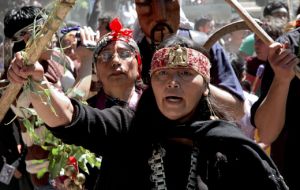MercoPress. South Atlantic News Agency
Chilean government cornered by Day 75 of Mapuche hunger strike
 Indigenous Mapuches are demanding the right to a fair trial
Indigenous Mapuches are demanding the right to a fair trial There is no resolution in sight for the Chilean indigenous Mapuche hunger strike. On Day 75, the health of the 34 prisoners is in danger. Eight have been hospitalized, with one needing surgery for appendicitis.
Chilean President Sebastián Piñera is in the United States where he addressed the U.N. General Assembly on human rights on Thursday, but he has not offered a solution to the strike that the prisoners will accept.
“If a Mapuche dies, the government will be the one responsible for the public disorder that follows,” said Sen. Juan Pablo Letelier, of the Socialist Party (PS).
It would also have an impact on Chile’s image abroad. Piñera is currently campaigning for Chile to be re-elected to the U.N. Human Rights Council.
Human rights groups from around the world are asking Chile’s government to resolve the hunger strike before any of the strikers die.
The prisoners are demanding the right to a fair trial. They were all arrested under anti-terrorism laws and a military justice code that subject them to prolonged detention, double jeopardy, and the use of anonymous witnesses against them in court.
They have said they will not end the strike until they are allowed direct dialogue with the government.
Piñera, elected last January as the nation’s first conservative president since the Pinochet dictatorship (1973 – 1990), has responded by saying that “the government has been open to dialogue with all indigenous people.”
And last week he announced the creation of a dialogue table for representatives of the Mapuche and the government, to be mediated by church leaders.
The dialogue table is expected to meet this Friday morning in Temuco, but the strikers and their families have rejected the discussions and will not attend. They said the dialogue table would only discuss an aid program called Plan Araucanía, and will not address their demands.
The International Federation of Human Rights sent a letter to Piñera last week outlining specific U.N. recommendations that Chile is breaking by applying the anti-terrorism laws to the Mapuche people. This includes recommendations from the Committee of the Elimination of Racial Discrimination and the U.N. Human Rights Council.
Reforms to the anti-terrorism laws and the military justice code have been circulating in Congress, but the prisoners are not satisfied with the changes.
Manuel Chocori, a Mapuche spokesperson, said that the anti-terrorism laws “continue to be discriminatory” and that they do not follow the U.N. International Labour Organization Convention 169, which Chile signed in 2008.
“The government is showing little respect for international agreements,” he said.
More than 100 Mapuche have been arrested as terrorists and are held in jails in southern Chile. Their crimes range from armed assault to arson, carried out in a campaign to reclaim ancestral lands that were sold by the government without the Mapuche’s consent.
In addition to protesting the anti-terrorism laws, the hunger strike is also against the militarization of the Araucanía Region (IX), where most Mapuche live, and the police’s use of excessive force against the Mapuche people.
By Kara Frantzich - Santiago Times




Top Comments
Disclaimer & comment rules-

-

Read all commentsI think that it´s wrong the asummition that the Chilean Gvt. is cornered. It is starting a tlak table with the real mapuche comuneros, not the mapuche terrorist that are in jail because they burnt houses, seemfields, barns, trucks and shoot fire guns against the police, even attented against an prosecutor, so they are being tried under the antiterrorist law as they deserve.
Sep 25th, 2010 - 05:15 pm 0it´s a distributive situation. chile must do as argentina; give them some land and some money; like some aborigen movements in argentina they build homes and give money to the people.
Sep 25th, 2010 - 06:47 pm 0In chile the problem is right wing political thinking; the see the different as a foe; mapuchens, peruvians, bolivians, argentines and rapa nuis. chile is a militarist and policiacal state; I hope chile can build an igualitarian state, an inclusive republica; giving social justice to original people. chile must imitate argentina in this matter; chile must conduct mapuche situation through social claim; give them houses, hospitals, roads; some subsidies so they can feel they are chileans. In argentina aborigins are in constitution and with social rights in law and money; they don´t challenge argentine nationality, all the contrary.
I hope chile can include in their rights and social service the original people.
it´s a shame for chile the mapuche actual situation. it+´s a shame for chile that nobody claim for apaolaza political asylum; his a fighter against pichotetism; he killed a killer, killers killled 10k people and are free. chile claim vengance for a poor guy in no man land; but don´t challenge killers in your nose.
In this political situation; it´s difficult for chilean justice to be free. perhaps brasil.
Commenting for this story is now closed.
If you have a Facebook account, become a fan and comment on our Facebook Page!